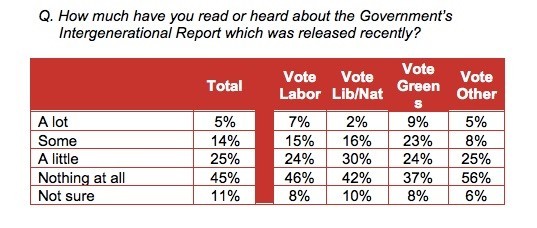The great majority of voters have heard little or nothing of the intergenerational report despite an intensive government campaign to alert them to the fiscal challenges facing Australia, today’s Essential Report shows.
Just 19% of voters have heard “some” or “a lot” about the intergenerational report, while 45% have heard nothing at all and 25% have only heard “a little”. The only voter segment with a reasonable level of engagement on the report are Greens voters, 32% of whom had heard some or a lot about the report.
The result is an indictment of Treasurer Joe Hockey’s efforts to promote the report as a means of restarting debate over the need for budget cuts, backed by an advertising campaign and regular media appearances by Hockey when he hasn’t been in court as part of his defamation suit against Fairfax.
Moreover, voters are puzzled as to why climate change does not feature significantly in the report. Some 46% of voters think climate change should be a priority when it comes to intergenerational issues, compared to 33% who don’t think it should be a priority (mostly Coalition voters and the elderly). The IGR mostly ignored climate change, except to note that it might have positive as well as negative consequences.
Hockey, however, can take comfort from the fact that Greens voters also back his suggestion that superannuation could be used to purchase homes. Some 46% of voters believe superannuation should be preserved for retirement compared to 41% who think it should be available to purchase homes, with both Labor voters (52%-38%) and Liberal voters (47%-42%) opposing Hockey’s idea, while Greens voters back it 50%-32%. The issue is an unusual one in which Liberal voters are at the centre while Labor and Greens voters are at opposite ends; a more normal distribution pattern is reflected in results by age, with younger voters backing the idea, 35- to 54-year-olds evenly divided and older voters strongly against it.
There was another unusual result in relation to the government’s decision to restore some assistance to the car industry despite its pending closure. Voters split nearly evenly on it, with 39% disapproving and 38% approving. But it was Labor voters who were most supportive — they backed it 45%-30%, perhaps suggesting the government might yet salvage some votes with the move in South Australia and Victoria. Liberal voters opposed it 47%-34%, an unusual level of opposition for a government policy, while Greens voters also opposed it 40%-32%, yet again demonstrating that the Greens’ quaint obsession with 20th-century manufacturing, beyond even that of Labor, is out of touch with their own voters.
On voting intention, a shift in favour of the Coalition: Labor is down a point on its primary vote to 39% while the Coalition (40%) and the Greens (9%) remain the same, for a two-party preferred outcome of 52%-48% in Labor’s favour, down from 53%-47% last week.









Crikey is committed to hosting lively discussions. Help us keep the conversation useful, interesting and welcoming. We aim to publish comments quickly in the interest of promoting robust conversation, but we’re a small team and we deploy filters to protect against legal risk. Occasionally your comment may be held up while we review, but we’re working as fast as we can to keep the conversation rolling.
The Crikey comment section is members-only content. Please subscribe to leave a comment.
The Crikey comment section is members-only content. Please login to leave a comment.